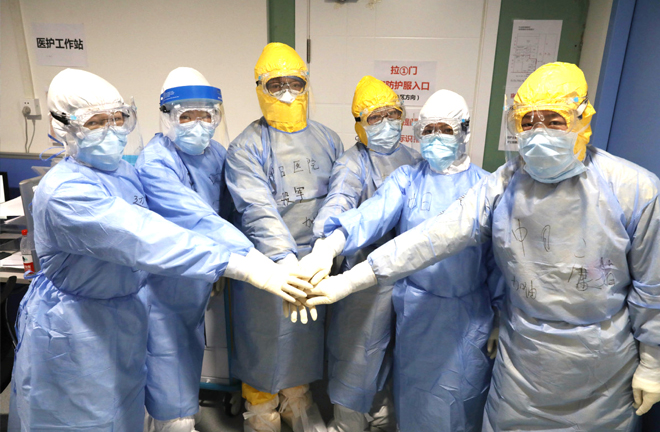National mobilization key to curbing contagion

By Feb. 9, 155 doctors and nurses from the China-Japan Friendship Hospital in Beijing had been sent to frontline hospitals in Wuhan. Photo: Zhu Xingxin/CHINA DAILY
Xi Jinping, general secretary of the Communist Party of China Central Committee, on Feb. 10 stressed resolutely winning the people’s war against pneumonia epidemic caused by the novel coronavirus.
Wearing a mask, Xi, also Chinese president and chairman of the Central Military Commission, visited a residential community, a hospital and a district center for disease control and prevention in Beijing.
The inspection came at a time when many people outside the epidemic center of Hubei Province resumed work after an extended holiday.
Xi said the situation at the moment remains very serious but expressed confidence that China can certainly obtain a full victory in the fight against the epidemic.
Fang Lei, a professor at Shandong University, said that China has what it takes to win the war thanks to the following factors: The centralized and unified leadership of the Party, as the political foundation, is key to preventing and controlling the epidemic. The capacity to mobilize resources for major undertakings is a great strength of China’s system. Powerful forces have been brought together by national mobilization to fight the epidemic. The country has sufficient financial and material resources. And the spirit of sharing both good times and bad flows in the blood of the Chinese people.
Xun Qingzhi, a professor from the School of Marxism at Peking University, said that among all soldiers in the war, the ones that move us the most are the medical workers, those who are called the “angels in white.” Without hesitation, they choose to guard tens of millions of people in times of danger, deserving our highest praise and respect.
Xun was also impressed by the selfless aid coming from all corners of the country. These facts prove again that the Chinese nation can overcome all challenges when its people are mobilized to realize the same goal.
Yu Xiaohui, a research fellow at the Shaanxi Academy of Social Sciences, described two “true warriors:” Zhong Nanshan, the 84-year-old academician that has headed to the front line, and Zhang Dingyu, who has been suffering from amyotrophic lateral sclerosis but still working at the front line as the president of Wuhan Jinyintan Hospital, one of the major hospitals treating patients infected with the virus.
“The deeds of many ordinary people are also quite touching. They don’t have any grand words, but it is they who have built the Great Wall of the Chinese nation defending against the epidemic,” Yu said.
“What has impressed me most about the epidemic prevention and control is the role and contribution of grassroots communities since the outbreak,” said Fan Peng, a research fellow at the Institute of Political Science under the Chinese Academy of Social Sciences. Communities are at the front line of epidemic prevention and control in cities. It’s necessary not only to focus on hospitals’ capacities of admission and treatment but also to continue strengthening the resource security and the prevention and control capabilities at the community level.
The shortage of professional disease control personnel in and weak prevention and control capabilities of communities are still shortcomings. The prevention and control of the epidemic must focus on both treatment and prevention. As such, it is urgent to innovate with ways and methods to empower communities and enhance the self-treatment and self-protection capabilities at the grassroots level.
Lin Jian, a research fellow with the National Academy of Development and Strategy at Renmin University of China, suggested increasing efforts across all aspects of legislation, law enforcement, justice and law compliance to comprehensively improve law-based prevention and governance abilities. It is necessary to improve the relevant legislation on epidemic prevention and control, strictly implement laws and regulations on epidemic prevention, control and emergency response, and report and publish about the epidemic situation in compliance with the law.
Overcoming the epidemic requires science and technology. Ye Benqian, deputy dean of the School of Marxism at the University of Electronic Science and Technology of China, said that we must increase scientific research efforts, promote the openness and sharing of relevant data, closely track virus mutations, and study prevention and control strategies and measures in a timely manner. It is necessary to strengthen the research and development of effective drugs and vaccines, focusing on combining scientific research with clinical practices and prevention and control practices.
edited by WENG RONG
